I am sure that there is a simpler way to do that,
but the only way I found,
without moment and moment-timezone, is:
first get the time zone offset is units (based on this answer):
const getTimeZoneOffset = (date, timeZone) => {
// Abuse the Intl API to get a local ISO 8601 string for a given time zone.
const options = {
timeZone, calendar: 'iso8601', year: 'numeric', month: '2-digit', day: '2-digit', hour: '2-digit', minute: '2-digit', second: '2-digit', hour12: false,
};
// @ts-ignore
const dateTimeFormat = new Intl.DateTimeFormat(undefined, options);
const parts = dateTimeFormat.formatToParts(date);
const map = new Map(parts.map((x) => [x.type, x.value]));
const year = map.get('year');
const month = map.get('month');
const day = map.get('day');
const hour = map.get('hour');
const minute = map.get('minute');
const second = map.get('second');
const ms = date.getMilliseconds().toString().padStart(3, '0');
const iso = `${year}-${month}-${day}T${hour}:${minute}:${second}.${ms}`;
// Lie to the Date object constructor that it's a UTC time.
const lie = new Date(`${iso}Z`);
// Return the difference in timestamps, as minutes
// Positive values are West of GMT, opposite of ISO 8601
// this matches the output of `Date.getTimeZoneOffset`
// @ts-ignore
return -(lie - date) / 60 / 1000;
};
and than:
export const getTimeStampOfDateInEnvTimeZone = (timeStamp:number, userTimezone: string, timezoneForTesting:string = null) => {
const envTimeZoneOffsetInMinutes = getTimeZoneOffset(new Date(timeStamp), timezoneForTesting || EnvSelector.TIME_ZONE);
const userTimeZoneOffsetInMInutes = getTimeZoneOffset(new Date(timeStamp), userTimezone);
const difference = userTimeZoneOffsetInMInutes - envTimeZoneOffsetInMinutes;
const diffInMilliseconds = difference * 60000;
return timeStamp - diffInMilliseconds;
};
those are unit tests to verify this code:
describe('test getTimeStampOfDateInEnvTimeZone method', () => {
it('should verify that is we get the correct ts when user is in "Asia/Jerusalem" tz of and env is in "America/New_York" time zone', () => {
expect.hasAssertions();
expect(getTimeStampOfDateInEnvTimeZone(1643530435160, 'Asia/Jerusalem', 'America/New_York')).toBe(1643555635160);
});
it('should verify that is we get the correct ts when user is in "Asia/Jerusalem" tz of and env is in "America/Santa_Isabel" time zone', () => {
expect.hasAssertions();
expect(getTimeStampOfDateInEnvTimeZone(1643303881092, 'Asia/Jerusalem', 'America/Santa_Isabel')).toBe(1643339881092);
});
it('should verify that is we get the correct ts when user is in "America/New_York" tz of and env is in "Asia/Jerusalem" time zone', () => {
expect.hasAssertions();
expect(getTimeStampOfDateInEnvTimeZone(1643555635160, 'America/New_York', 'Asia/Jerusalem')).toBe(1643530435160);
});
it('should verify that is we get the correct ts when user is in "America/Santa_Isabel" tz of and env is in "Asia/Jerusalem" time zone', () => {
expect.hasAssertions();
expect(getTimeStampOfDateInEnvTimeZone(1643339881092, 'America/Santa_Isabel', 'Asia/Jerusalem')).toBe(1643303881092);
});
it('should verify that is we get the correct ts when user is in "America/Santa_Isabel" tz of and env is in "America/Santa_Isabel" time zone', () => {
expect.hasAssertions();
expect(getTimeStampOfDateInEnvTimeZone(1643339881092, 'America/Santa_Isabel', 'America/Santa_Isabel')).toBe(1643339881092);
});
it('should verify that is we get the correct ts when user is in "Africa/Douala" tz of and env is in "Pacific/Tahiti" time zone', () => {
expect.hasAssertions();
expect(getTimeStampOfDateInEnvTimeZone(1643808653000, 'Africa/Douala', 'Pacific/Tahiti')).toBe(1643848253000);
});
it('should verify that is we get the correct ts when user is in "Pacific/Tahiti" tz of and env is in "Africa/Douala" time zone', () => {
expect.hasAssertions();
expect(getTimeStampOfDateInEnvTimeZone(1643555635000, 'Pacific/Tahiti', 'Africa/Douala')).toBe(1643516035000);
});
});

